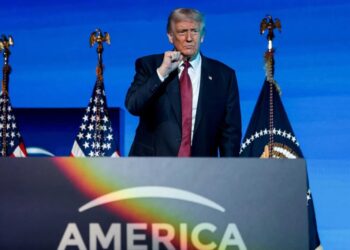AI and business leaders are split on whether AI will take over jobs or create new roles that mitigate disruption.
The spectrum of predictions ranges from Anthropic CEO Dario Amodei, who thinks AI could eliminate up to half of white collar, entry-level jobs in the next five years, to Elon Musk, who sees a future that resembles heaven.
From Jensen Huang to Jamie Dimon, here is what some of the biggest names in tech are saying about how AI will impact jobs.
Dario Amodei
AI may eliminate 50% of entry-level white-collar jobs within the next five years. That was the stark warning from Dario Amodei, the CEO of AI startup Anthropic, in May. Despite backlash from some in Silicon Valley, Amodei hasn’t backed down.
“The first step towards solving these problems is kind of being honest with the population that these problems exist,” Amodei told Axios during an event in September.
Amodei said the rate of AI advancement and its adoption by society make predicting the actual timetable for job displacement difficult.
“As with most things, when an exponential is moving very quickly, you can’t be sure,” he said. “This could happen faster than I imagine, this could happen slower than I imagine, or something very different could happen. I think it is likely enough to happen that we felt there was a need to warn the world about it and to speak honestly and in candid terms about it.”
The disconnect, Amodei said, is that some people think because of what AI is capable of now that such a mass displacement isn’t possible.
“What I’m really worried about is where the technology is going,” he said. “And I think there’s a little disconnect here where people will say, ‘Oh you’re worried about AI is going to do to jobs, but AI can’t do this, AI can’t do that,’ well we’re talking about today’s AI.”
Elon Musk
Elon Musk compared AI to a “supersonic tsunami” that will upend the labor market.
“I think there will be actually a high demand for jobs, but not necessarily the same jobs,” Musk recently told Joe Rogan on the comedian’s podcast. “So I mean this is actually, this process has been happening throughout modern history.”
Musk said desk jobs are likely to be among the first to be replaced.
“Anything that’s physically moving atoms, like cooking food or farming, anything that’s physical, those jobs will exist for a much longer time,” he said. “But anything that is digital, which is just someone at a computer doing something, AI is going to take over those jobs like lightning.”
Ultimately, Musk is bullish on AI but cautions that there will likely be “trauma and disruption” along the way. In one scenario, he discussed with Rogan, society reaches an almost utopian level of existence because wealth is so accessible that there’s a “universal high income.”
Jensen Huang
Jensen Huang, the CEO of chipmaker Nvidia, was withering when asked about Amodei’s comments. “I pretty much disagree with almost everything he says,” Huang said. Amodei “thinks AI is so scary,” but only Anthropic “should do it,” he continued. An Anthropic spokesperson told BI that Amodei had never made that claim.
Huang said it’s more likely that an AI user replaces a job than AI itself.
“It’s very likely that the companies that use AI first, that use robotics technology first, will be the most successful first, and they will end up hiring more people,” he said in late October. “You’re going to lose your job not to somebody — not to a robot, you’re going to lose your job to somebody who uses a robot. You’re going to lose your job to somebody who uses AI.”
Jamie Dimon
JPMorgan CEO Jamie Dimon said AI will shorten the work week.
“My guess is the developed world will be working three and a half days a week in 20, 30, 40 years, and have wonderful lives,” Dimon said in November at an event in Miami.
That being said, Dimon said society needs to prepare itself for job displacement. He said governments and the private sector need to prepare “today” for a response that consists of retraining, income assistance, and relocation programs.
“It will eliminate jobs,” Dimon said. “People should stop sticking their heads in the sand.”
Sam Altman
“AI is for sure going to change a lot of jobs” and “totally take some jobs away, create a bunch of new ones,” Altman said during a May episode of “The Circuit” podcast.
The OpenAI CEO said that although people might be aware that AI can be better at some tasks, like programming or customer support, the world “is not ready for” humanoid robots.
“I don’t think the world has really had the humanoid robots moment yet,” he said, describing a scenario where people could encounter “like seven robots that walk past you” on the street.
“It’s gonna feel very sci-fi. And I don’t think that’s very far away from like a visceral ‘oh man, this is gonna do a lot of things that people used to do,'” he added.
Speaking at the Snowflake Summit in June, Altman said AI agents are already acting like junior employees.
Jim Farley
Like Amodei, Ford CEO Jim Farley sees major changes coming.
“Artificial intelligence is going to replace literally half of all white-collar workers in the US,” Farley said during an appearance at the Aspen Ideas Festival.
Farley said he’s concerned that too much of the American education system is focused on four-year degrees instead of trades.
Andy Jassy
Amazon CEO Andy Jassy said that AI is already changing workflows. He said it will soon lead to a reduction in some jobs.
“As we roll out more Generative AI and agents, it should change the way our work is done,” Jassy said in a memo posted to the Amazon website. “We will need fewer people doing some of the jobs that are being done today, and more people doing other types of jobs.”
Yann LeCun
Yann LeCun, Meta’s chief AI scientist, wrote a short LinkedIn post just after Huang dismissed Amodei, saying, “I agree with Jensen and, like him, pretty much disagree with everything Dario says.”
LeCun has previously taken a more optimistic stance on AI’s impact on jobs. Speaking at Nvidia’s GTC conference in March, LeCun said that AI could replace people but challenged whether humans would allow that to happen.
“I mean basically our relationship with future AI systems, including superintelligence, is that we’re going to be their boss,” he said.
Mustafa Suleyman
Microsoft AI CEO Mustafa Suleyman said it’s clear AI will upend the labor market. It’s just a question of how soon it will be.
“The question is time horizons. Is it 50 years, or is it 10 years? The trajectory is clear,” Suleyman said at a Paley Center for Media event in October, per Forbes.
Suleyman is optimistic about what super-intelligent AI will mean for society. He said that AI could replace many jobs that humans may not even want to do.
“I don’t believe that the majority of people do want to work on a toothpaste packing line, just screwing in the top of a toothpaste tube,” Suleyman told podcaster Marina Mogilko in November. “I think people want creative work. I think people want to pursue their passions.”
Demis Hassabis
Demis Hassabis, the cofounder of Google DeepMind, said in June that AI would create “very valuable jobs” and “supercharge sort of technically savvy people who are at the forefront of using these technologies.” He told London Tech Week attendees that humans were “infinitely adaptable.”
He said he’d still recommend young people study STEM subjects, saying it was “still important to understand fundamentals” in areas including mathematics, physics, and computer science to understand “how these systems are put together.”
Geoffrey Hinton
You would have to be “very skilled” to have an AI-proof job, Geoffrey Hinton, the so-called “Godfather of AI,” has said.
“For mundane intellectual labor, AI is just going to replace everybody,” Hinton told the “Diary of a CEO” podcast in June. He flagged paralegals as at risk, and said he’d be “terrified” if he worked in a call center.
Hinton said that, eventually, the technology would “get to be better than us at everything,” but said some fields were safer, and that it would be, “a long time before it’s as good at physical manipulation.
“So a good bet would be to be a plumber,” he added.
Brad Lightcap
Like Altman, OpenAI’s COO Brad Lightcap doesn’t see the sky falling.
“We have no evidence of this,” Lightcap said during the “Hard Fork” podcast taping. “And Dario is a scientist. And I would hope he takes an evidence-based approach to these types of things.”
Lightcap said that every technology changes the job market.
“I think every time you get a platform shift, you get a change in the job market,” he said.” I mean, in 1900, 40 percent of people worked in agriculture. It’s 2 percent today. Microsoft Excel has probably been the greatest job displacer of the 20th century.”
Eric Yuan
Eric Yuan’s Zoom played a significant role in transforming the workplace during the COVID-19 pandemic. He said AI will upend it even more.
“I feel like if A.I. can make all of our lives better, why do we need to work for five days a week?” Yuan told The New York Times in September. “Every company will support three days, four days a week. I think this ultimately frees up everyone’s time.”
Yuan said that some jobs will be replaced, but there will still be a need for workers.
“For some jobs, like entry-level engineers, we can use A.I. to write code,” he said. “However, you still need to manage that code. You also create a lot of digital agents, and you need someone to manage those agents.”
Aravind Srinivas
Perplexity CEO Aravind Srinivas said he sees a middle ground between Amodei’s prediction of near-immediate doom and overly rosy projections of how soon AI will create new jobs.
“More entrepreneurs need to emerge to create new jobs, because every company is going to need fewer people,” Srinivas told Matthew Berman during a recent interview. “Either the other people who lose jobs end up starting companies themselves and make use of AIs, or they end up learning AIs and end up contributing to new companies that need to hire some people.”
Srinivas said there will be a “temporary phase” of job displacement. He said there’s no need “to sugarcoat” what will happen.
“During that phase, you’re going to see some people struggling,” he said.
Read the original article on Business Insider
The post The debate over whether AI will replace jobs or create new ones is heating up. Here’s what leaders are saying. appeared first on Business Insider.




